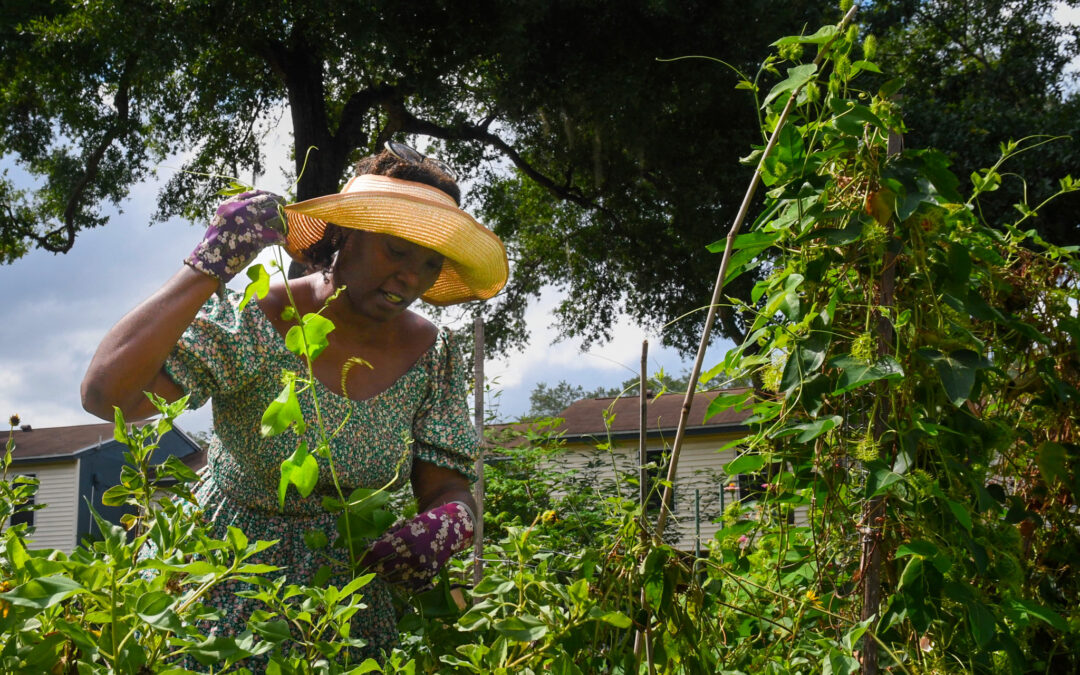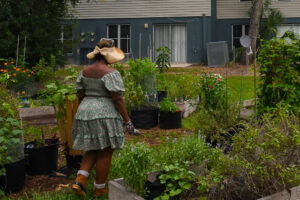Growing a community: Residents advocate for public garden
City works with nonprofit affordable housing organization to improve volunteer garden program
July 17, 2024
By Zoey Thomas
When Rolesia Barton got a call from The Meadows Apartments approving her public housing application, her life changed.
“It literally saved me and my sons from the destitution of homelessness,” she said.
The U.S. Army veteran, 44, still lives at The Meadows with her two sons eight years later. A former South Carolina resident, Barton is always looking for ways to find community in Winter Park, she said. Two years ago, she found the perfect outlet: managing a community garden.
Barton now grows plants from habanero peppers to hibiscus flowers in her complex’s courtyard for residents to pick, cook and enjoy — for free. But the project hasn’t reached its full potential, she said. That’s largely because Barton funds the garden out of her own pocket.
After a trip to City Hall last month, Barton is working with city leaders to turn her garden from a passion project into a communitywide resource.
The Meadows, just west of the Ravaudage development off U.S. 17-92, opened in 1975 to house low-income Central Florida families. The building is one of six managed today by the city-supported nonprofit Winter Park Housing Authority.
Housing Authority management invited Fleet Farming, a nonprofit urban agriculture program, to deliver nine garden beds to The Meadows about three years ago, Barton said. But after the plots were set up in the building’s courtyard, no one took the initiative to care for them, she said.
“I was walking across the garden, and me and my son were walking past the bananas, and he was like, ‘Man, these bananas are going to die,’” she said. “And I said, ‘They just need food, and they’ll be all right.’”
The building manager at the time overheard Barton’s conversation and asked if she’d be interested in taking over the garden, she said. Barton jumped at the chance.
She originally had about 10 volunteers helping her, she said. But the number eventually dwindled until only Barton and her two teenage boys remained.
Barton didn’t give up. She continued working alone, turning the nine garden beds left by Fleet Farming into a sprawling 600-square foot horticultural expanse in two years.
“I want to put my foot in where I can see there’s something lacking,” she said. “You want some basil for your spaghetti, we’ve got it out here. You want lemongrass for your tea, we’ve got it out here. You don’t have to go and buy that stuff — it just helps people to save money.”
Barton went to her first City Commission meeting to ask for support in June. She got the idea after talking with Equity Council Corp president LaWanda Thompson for advice, she said.
Thompson, 46, is a longtime community advocate. She proposed building a community supported agriculture garden in the historically Black Hannibal Square neighborhood to commissioners in 2020 and again in 2022.
Community supported agriculture, or CSA, gardens were first developed by Black farmers in the 1950s to foster relationships between farmers and local residents. Thompson hoped to manage a mixture of staff and volunteers at her own proposed CSA. Food produced would go mainly toward feeding the area’s disadvantaged senior citizen population, she said.
But commissioners never gave Thompson the land or financial support she requested.
“My issue with Winter Park is they care about land, developers and parking more than actually helping the community,” she said.
Thompson’s proposal was “quite ambitious,” said Commissioner Marty Sullivan in an email to the Voice. Thompson did not act on the details necessary to initiate the project, he said.
Thompson told Sullivan the garden could operate on 0.3 acres with $120,000 in start-up funding in an email July 2022. Her nonprofit, Equity Council Corp, would manage the garden, pay staff and recruit volunteers, she said.
Because her own project never left the ground, Thompson warned Barton she wouldn’t find support from the city if she asked for help at The Meadows, Barton said. But when Barton said she wanted to attend a commission meeting anyway, Thompson joined her.
The two women spoke during public comment. Barton introduced herself to commissioners and asked their support for one of her most pressing needs: a fence to surround the garden. Thompson then urged commissioners to help.
“When residents like Ms Barton want to power through and do more with the garden, if she needs tools, if she needs fertilizer, if she needs seeds, whatever she needs, she shouldn’t have to fund that out of her own pocket,” Thompson said. “That is shameful.”
To Barton’s surprise, she received positive feedback immediately, she said. Sullivan visited Barton at The Meadows to discuss next steps for the garden three weeks later.
Rolesia Barton works in the community garden at the Meadows Apartments in Winter Park. Photo: Zoey Thomas
Barton’s small volunteer-based garden posed an easier target for assistance than Thompson’s community supported agriculture model, Sullivan said.
“A CSA is a group of people that contribute money for a farm,” he said. “It’s a real business operated with intensive labor and expense.”
Although Thompson’s idea never materialized, Sullivan looks forward to helping Barton with her her garden at The Meadows — a garden he didn’t know existed before she spoke up at public comment, he said.
The garden’s most pressing current needs include a fence to keep out critters and prevent theft; a better lighting system, so Barton can keep an eye on the plants at night; and a larger volunteer pool, maybe drawing from neighboring high schools. Sullivan offered to talk with city staff about making the requests happen.
All Winter Park Housing Authority buildings have community gardens, although none are as large as The Meadow’s, said Winter Park Housing Authority Interim Director Tarena Grant, who also attended the meeting with Sullivan.
Taking the lead on volunteering initiatives, especially ones that promote food security, helps tenants build self-sufficiency, Grant said. She asked Sullivan to look into also improving lighting at Tranquil Terrace and The Plymouth, two other Housing Authority properties, which both serve seniors.
“It’s about tapping into strengths of resident volunteers,” she said. “We look forward to working with the city … we’re open to however they see best to streamline the process.”
Barton, for her part, envisions a network among all Winter Park community gardens, she said. If one garden needed a specific plant or gardening tool, they could share among themselves — building community while doing so, she said.
Community gardens aren’t new to Winter Park. Our Whole Community, an organization of multiple local Christian churches including St. Margaret Mary and St. Mary Magdalen, has run a community garden just south of Depugh Nursing Center, off of Park Avenue, since 2010.
But the garden’s leader, Olive Mackey, 73, said the garden doesn’t produce enough food to feed a family — much less a community, as Barton hopes to accomplish with her own project. The Our Whole Community lot holds 21 wooden garden beds, which are rented out to individual gardeners in exchange for free compost, mulch and garden education events.
Mackey, a retired Department of Agriculture employee and UF Institute of Food and Agriculture professor, said community gardening benefits the spirit as well as the body.
“I don’t know anybody who has not felt good when they see something grow that they grew themselves,” she said.
The next step for the Winter Park Housing Authority garden will take place when Barton and her building directors meet with the city’s Sustainability Division July 24. With her garden’s future growing before her eyes, Barton said her only regret is not going to City Hall sooner.
WinterParkVoiceEditor@gmail.com



Well done again, Zoey.
Thanks for the great article.
I would think there must be a local fencing company out there who would do the fence at cost or less for the good publicity. Who do we know Voice readers?
The time commitment and expense of growing your own vegetables makes for very expensive crops. If some people want to do it, fantastic, but it’s a ton of work for a few veggies for a few people. (See Depugh Nursing volunteer comments) As a taxpayer, I’d rather see Instacart deliver fresh veggies/fruits to the management office on site. Let them distribute them. If the city leaders want to help the residents, why require them to work in a field? Publix is across the street. Whole Foods is around the corner. If we want healthy residents why make them work in the sweltering heat? Run a pilot program for 3 months and see if there is interest and how much it costs. This city is drowning in money. If the leaders are determined to spend every nickel, let’s try to do something that benefits as many people as possible.
Pitt,
You speak as a businessman. And us folks in business often miss the main point.
I checked, Instacart has no listings for: exercise, fresh air, community, bonding with neighbors, counseling a young person, instilling a love of gardening, stress relief, the magic of plants growing, etc.
Sure, it’s tough to pull off but there is less soul in getting a bag of groceries delivered.
jts
Well said John!
JTS, I was going to make the same points, but you said it better. I would also add, to suggest Publix and Whole Foods because they are so close by – consider if they attempt to walk, they take their life in their hands crossing 17-92. It’s simply not a walkable area at all, especially when carrying groceries. Also, no one is being required to work in the sweltering heat. I promise you, there are enough people who greatly enjoy gardening (for all the reasons listed above and more), even if it is hard work. Most of our growing season is in the cooler months here in central Florida (not much being done during the worst of the heat).
John Skolfield III
👏 👏 👏
Thank you for speaking out on behalf of the “bigger picture” here. It’s about collective community, education, pride in one’s work and with a healthy eating bonus on the consumer level.
Kudos John Skolfield!
I like Pitts idea and I totally buy in on John’s points. Let’s see both happen.
Great story, by the way. This is what community can be.
Great point and spot on!
I’m with John Skolfield!
Just want to put an exclamation point to his reply!
Pitt Warner-
In a world full of grumpy old men, you could win the award for grumpiest old man.
Walter, (if that’s your name)
Grumpy? I’m advocating free veggies and fruits delivered to the Meadows via Instacart as opposed to a $120,000 grant. Which would do more good for the most people as quickly as possible?
“Olive Mackey, 73, (Depugh Nursing gardener) said the garden doesn’t produce enough food to feed a family — much less a community, as Barton hopes to accomplish with her own project”.
The garden and gov’t red tape will take months. It’s already been 2 years since her 1st request! Fruit/veggie delivery can start in a couple weeks. But, as I wrote: “If some people want to do it, fantastic, but it’s a ton of work……”
Ms. Barton, along with an additional resident here at The Meadows places an abundance of time, sweat and energy into the garden. It is always such a delight to witness their unwavering efforts in maintaining it.
Ms. Barton is always eagerly willing to teach others about gardening and she is very passionate about it. This is very much needed in our community, especially for the younger generation. In today’s society we have gotten away from teaching our youth how to survive off the land, a skill that MAY one day be our only solution to sustaining life!
Let’s help her be great!!
You can have more than one good idea and the more the better.